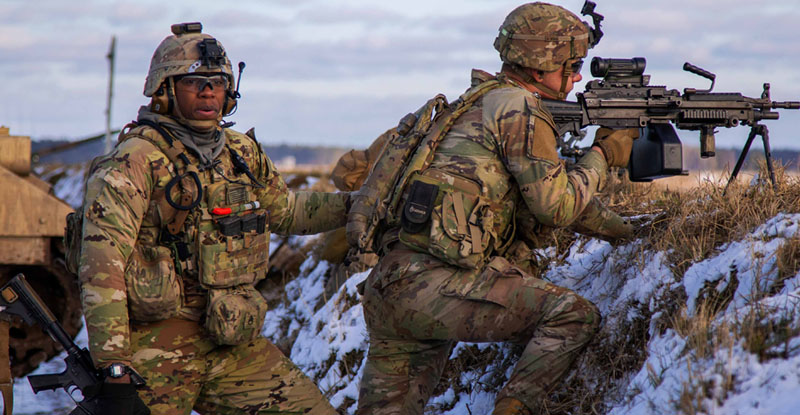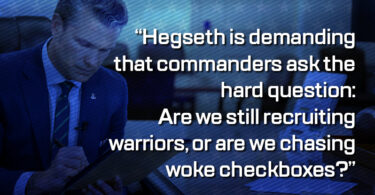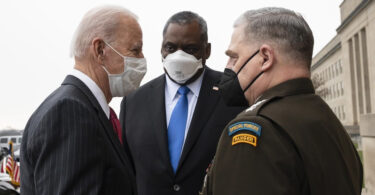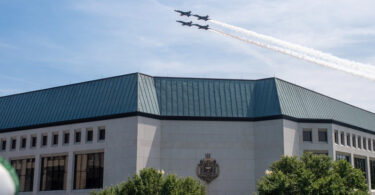By MG Patrick H. Brady, US Army (ret) and Congressman and Col. Michael Waltz, US Army
With recruitment rates to the U.S. military falling, attention is turning to the rise of woke politics, which is undermining public confidence in America’s military leaders.
The U.S. military faces a self-inflicted threat to its preparedness to deter, fight and win wars. An essential, battle-tested element of military culture—colorblindness—is being undermined.
Unless the trend is reversed, our national security will be at increased risk. The reversal could be done at no cost, requiring only a policy decision and the reorientation of relevant training.
Selflessness, which has been vital to the warrior ethos for generations, requires subordination of self and subgroup identity and the ability to regard teammates’ racial and ethnic differences as inconsequential.
In the Army and Marines, sayings such as “We’re all green” or “We all bleed red” were part of training that transformed millions of diverse civilians into war fighters.
Selflessness is needed to assemble military teams that can survive violent combat. Effective teams are built on committing one’s life to the mission and to all teammates, regardless of racial differences.
Trust that such commitment is reciprocal binds war fighters together. But that ethic is under attack.
At the Air Force Academy, cadets have been taught that the term “colorblind” is offensive and that it’s preferable to be “color conscious.”
Rather than teach future military leaders that “colorblindness” is a cultural imperative, the Pentagon unnecessarily focuses on, and even elevates, race and maintains an obsessive focus on racial demographics.
Worse, it uses racial preferences in officer accession programs and sometimes in command, promotion and schooling selections.
Such practices aren’t merely antithetical to true selflessness and the law; they also threaten military cultural norms like unit cohesion and the forces’ “selfless servant warrior ethos.”
Training that in earlier years was intended to ensure equal opportunity and dignity and respect for all has been displaced by diversity, equity and inclusion curricula with often vague language that emphasizes differences.
Under the guise of inclusion, preferences have evolved to “balance” racial demographics—despite such balancing’s dubious constitutionality—at the expense of selflessness.
Viewpoint diversity can be beneficial even in an autocratic organization such as the military.
What’s harmful is the Defense Department’s uncritical focus, through DEI, on racial differences that has weakened the colorblind warrior culture, eroded morale, undermined unit cohesion, and compromised combat effectiveness.
This fixation also diminishes trust and confidence in the chain of command. Because of preferences’ questionable legality, commanders deny their use or try to camouflage them under the label of “inclusion.”
War fighters aren’t fooled. Depriving them of the best-qualified leaders of any race has potentially disastrous consequences.
This cultural shift isn’t obvious to those outside the military, in part because it isn’t immediately measurable.
The harm becomes clear only when a unit is subjected to stress and performs less effectively—and then only if an observer is there and knows what to look for.
We are two of the many American war fighters trained to be selfless and colorblind. On the battlefield, we saw that culture save lives and accomplish missions.
We served with many outstanding minority officers and enlisted war fighters who embraced this culture. Their race, and ours, was inconsequential to the mission and our commitments to each other.
Never was either of us concerned with the race of a bomber pilot called in for close air support, the racial mix of a quick-reaction platoon coming to our rescue, or the race of a copilot when taking enemy fire during a medevac mission.
We wanted the best because our lives and mission depended on it.
Military leaders should reverse course and abandon their hyperfocus on race. Instead, they should embrace colorblindness—the cultural imperative that has helped make our forces indomitable.
Mr. Brady is a retired U.S. Army major general who served in Vietnam and is a Medal of Honor recipient. Mr. Waltz, a Republican, represents Florida’s Sixth Congressional District. He is a colonel in the Army National Guard and served in Afghanistan.








Leave a Comment